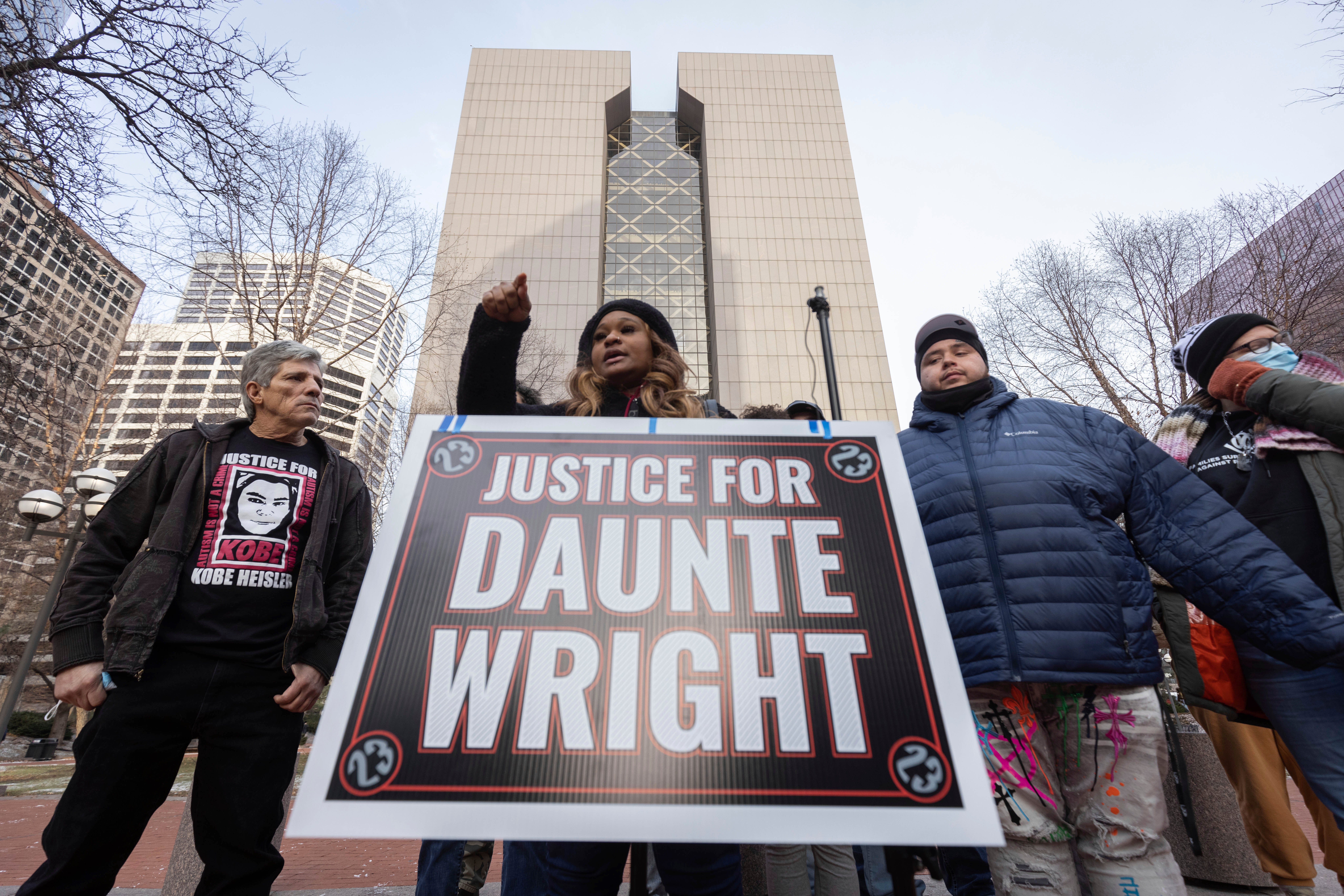Key moments in the police shooting of Daunte Wright
Former police officer Kim Potter is standing trial in Minnesota on manslaughter charges in the fatal shooting of Daunte Wright

Your support helps us to tell the story
From reproductive rights to climate change to Big Tech, The Independent is on the ground when the story is developing. Whether it's investigating the financials of Elon Musk's pro-Trump PAC or producing our latest documentary, 'The A Word', which shines a light on the American women fighting for reproductive rights, we know how important it is to parse out the facts from the messaging.
At such a critical moment in US history, we need reporters on the ground. Your donation allows us to keep sending journalists to speak to both sides of the story.
The Independent is trusted by Americans across the entire political spectrum. And unlike many other quality news outlets, we choose not to lock Americans out of our reporting and analysis with paywalls. We believe quality journalism should be available to everyone, paid for by those who can afford it.
Your support makes all the difference.Kim Potter a former police officer in Brooklyn Center Minnesota, is charged with manslaughter in the April 11 shooting death of 20-year-old Daunte Wright a Black motorist. Here are some key moments in the case:
April 11 — Police in Brooklyn Center, a Minneapolis suburb, stop a car driven by driven by Wright at around 2 p.m. Police say when they tried to arrest Wright on an outstanding warrant, he reentered his car and tried to drive away, and an officer shot him. News of the shooting sparks angry protests, including outside the city's police station. Not far away in downtown Minneapolis, former Minneapolis Officer Derek Chauvin is standing trial in George Floyd's killing.
April 12 — The officer who shot Wright is identified as 26-year veteran Kim Potter. Chief Tim Gannon says he believes Potter meant to use her Taser and plays her body-camera footage at a news conference that shows her shouting “I'll tase you! Taser! Taser! Taser!" Hundredds of protesters defy curfew to gather outside the city police station for a second night. Police use gas and flash-bang grenades to try to drive them away. Mayor Mike Elliott calls for Potter to be fired.
April 13 — Potter resigns. Gannon resigns. Elliott and the City Council fire the city manager, who has oversight of police. Hundreds of protesters face off with police again at nightfall outside police headquarters, where National Guard soldiers join officers in riot gear.
April 14 — Potter is charged with second-degree manslaughter. Several hundred demonstrators again clash with police outside headquarters.
April 15 — Wright’s family and some community members call for more serious charges against Potter. Hundreds of protesters again confront police at headquarters, with some tying air fresheners to fencing as a critique of one of the reasons officers were said to have stopped Wright’s car. A criminal complaint said officers stopped Wright’s car for having an air freshener obscuring the windshield and for expired tags.
April 16 — A federal judge issues a restraining order prohibiting police from arresting journalists or using force against them after some say they were harassed and assaulted by officers. Demonstrators protest again outside police headquarters.
April 17 — Protests continue.
April 18 — Two National Guard members report being fired upon as they patrolled a neighborhood in Minneapolis.
April 22 — A funeral service is held for Wright in Minneapolis, with the Rev. Al Sharpton decrying “the stench of racism" and police brutality in Minnesota. Meanwhile, activists demonstrate outside the home of the county prosecutor handling Potter's case to demand murder charges.
May 15 — The Brooklyn Center City Council passes a resolution to create new divisions of unarmed civilian employees to handle non-moving traffic violations and respond to mental health crises.
May 21 — Attorney General Keith Ellison announces that his office will prosecute Potter, after Washington County Attorney Pete Orput returned the case to Hennepin County.
Sept. 2 — Ellison adds a first-degree manslaughter charge against Potter.
Sept. 28 — Brooklyn Center says police have been instructed to release people cited for low-level crimes and to only take them into custody if required by law.
Nov. 30 — Jury selection begins in Potter's trial.
Dec. 8 — Opening statements are made and the first witnesses testify at the trial.
Dec. 17 — Potter testifies that she “didn’t want to hurt anybody” the day she shot Wright, saying she shouted a warning about using her Taser on Wright after she saw fear in a fellow officer’s face. She says she was “sorry it happened.”
Dec. 20 — Closing arguments are made and the jury begins deliberating.
___
Find the AP’s full coverage of the Daunte Wright case: https://apnews.com/hub/death-of-daunte-wright